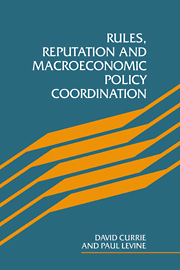Book contents
- Frontmatter
- Contents
- Acknowledgements
- Introduction
- Part I General issues
- 1 Macroeconomic policy design and control theory — a failed partnership?
- 2 International policy coordination — a survey
- 3 The European road to monetary union
- Part II Theory and methodology
- Part III Fiscal and monetary policy in interdependent economies
- Bibliography
- Index
1 - Macroeconomic policy design and control theory — a failed partnership?
Published online by Cambridge University Press: 03 December 2009
- Frontmatter
- Contents
- Acknowledgements
- Introduction
- Part I General issues
- 1 Macroeconomic policy design and control theory — a failed partnership?
- 2 International policy coordination — a survey
- 3 The European road to monetary union
- Part II Theory and methodology
- Part III Fiscal and monetary policy in interdependent economies
- Bibliography
- Index
Summary
The subject of this chapter is the applicability of control theory to the pressing questions of macroeconomic policy design that face us, both domestically and in the international arena. I approach the issue with some trepidation, mindful of the dangers of claiming too much in the field of policy design. Those were nicely stated in a broader context by that eminent biologist, Sir Peter Medawar (1984), when he wrote:
It is not their wrongness so much as their pretensions to Tightness that have brought economic predictions and the theory that underlies them into well-deserved contempt. The dogmatic self-assurance and the asseverative confidence of economists are additional causes of grievance — self-defeating traits among people eager to pass for scientists.
The control theory that has mostly been applied in economics has been taken over from engineering. This theory tells us how best to control a physical system (a space-ship, for example) in order to achieve certain objectives (to reach and return from the moon) by appropriate adjust'ment of the instruments of control (the rockets and stabilisers of the space ship), subject to the physical laws constraining the behaviour of the system. These control techniques have been applied with considerable success in a wide range of physical and engineering applications — the control of chemical process plants, electronic systems, rockets, to name just three. The problem of control in economics is often posed in similar terms.
- Type
- Chapter
- Information
- Rules, Reputation and Macroeconomic Policy Coordination , pp. 21 - 42Publisher: Cambridge University PressPrint publication year: 1993



